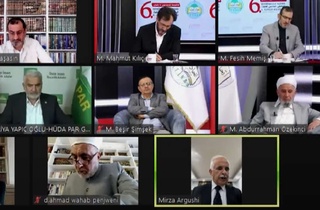In his presentation titled “The Role and Importance of the Kurds in the Liberation and Protection of Jerusalem from Past to Present”, Ergushi especially drew attention to Saladin’s success in uniting all Muslim nations for the liberation struggle of Jerusalem.
Pointing out that the conquest of Jerusalem took place step by step, Ergushi said: “Jerusalem’s conquest lasted for 12 years. During this period, Saladin carried out many projects to win the hearts and minds of all Muslims. Thus, he was able to gain the support of Ummah and achieve victory over the disbelievers.
“Saladin united all Muslims through improving many strategies”
“Saladin developed many strategies, united Muslims, gathered power in one hand, and led the fight for the liberation of Masjid al-Aqsa by bringing Muslims and mujahideen in other Islamic regions together. We see the biggest example of this in the Battle of Hattin,” Ergushi said.
“I wish that a new commander like Saladin would be brought up among Kurds. My wish should not be seen as a racist approach. I make the wish because of the hereditary characteristics of people,” Ergushi stated, adding that the anti-Islamic western countries are making great efforts to break up the Kurdish people because they fear that someone from the Kurds will rise up again and ensure the unity of Islam.
“The life of Saladin, the Kurd, must be studied thoroughly”
“We believe that the life of Saladin, the Kurd, must be studied thoroughly. Because the conditions of that time and today's are very similar. We will not be content with a detailed study of his life. We will also look for ways to apply his life to our own. We need to see Saladin that collaborated with Kurds, Arabs, and Turks in order to fight against the invading crusaders, and we must act accordingly.”
Erguşi said that many Kurdish fighters had attended the conquest of Jerusalem and settled in Jerusalem after the conquest.
“There are still many Kurds in various regions of Palestine at the moment,” Ergushi noted.
Reminded that Saladin ultimately decided not to destroy the churches after the conquest although the crusaders had demolished mosques during the occupation, Ergushi went on to say: “The Crusaders did the same brutalities in Jerusalem that the Mongols did in Baghdad. They killed thousands of Muslims, even Jews, and Christians of their own religion.
Underlining that Balfour Declaration was the resumption of the Crusader's occupation, Ergushi said: “They aimed to establish a zionist state in Palestine. Because they are enemies of human nature. Carnage and destruction are inseparable parts of their characters. They are enemies of all humanity. The United Kingdom, in particular, supported them and took in part the establishment of a Jewish state there.”
“It is necessary for all Muslims to support Al Aqsa Mosque and Palestinians”
“Muslims cannot stand by folded arms in front of the genocide, repression, and intimidation of the zionist occupation regime. They have to take a stand against them,” Ergushi emphasized.
Ergushi listed what Islamic scholars should do for Al Aqsa Mosque as follows:
- To remind people of the virtue and importance of Masjid al-Aqsa in Islam, and to struggle to protect and defend it.
- To make efforts and to unite our exertions to protect Al Aqsa Mosque and the sacred values of Muslims.
- To support Al Aqsa Mosque and Palestinians and to put heart and soul into the works for the cause of Jerusalem.
- To visit Al Aqsa Mosque and to perform the prayer there within the bounds of possibility.
- To provide financial assistance to Al Aqsa Mosque in order to make the mosque economically independent.
- To defend Al Aksa Mosque with pen and language, that is, with words and writing.
- To pray for the protection of the Al Aqsa Mosque. (ILKHA)



 Dünya
Dünya
 Dünya
Dünya
 Güncel
Güncel
 Dünya
Dünya
 Dünya
Dünya
 Dünya
Dünya
 Güncel
Güncel
 Güncel
Güncel
 Dünya
Dünya
 Güncel
Güncel





